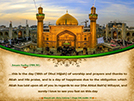Preface
- Details
- Hits: 26655
Preface
Our Belief in Ahl al-Bayt [as]
--------------------------------------------------------------------------------
Imam al-Rida is one of the bed-rocks of Islamic thought and one of its main rich sources of knowledge. After the demise of his father Imam Mousa ibn Ja'fer (A.S.), the secrets of the Divine Message and the keys to its treasures became attainable to him, so he quenched his thirst therefrom and derived the source of his intellectual contribution from the same.
He is one of the Twelve Imams of the Ahl al-Bayt (A.S.) who enriched the Islamic thought with various types of knowledge due to the knowledge they instructed their students to write down, or in providing their answers to the questions put forth to them by others, or to what history has narrated to us of their scientific and theological discourses with followers of other Muslim sects.
The distinction which characterized the Imams of the Ahl al-Bayt (A.S.) and which attracts our attention when we study their biographies is the fact that they were obligated to others to provide them with knowledge while nobody was obligated to accept it from them. This is a divine bliss with which God endowed them in order to achieve through them the establishment of His Proof against His creation, something with which they were credited even by the rulers among their contemporary opponents and by the most prominent thinkers among their contemporaries.
Supporting this phenomenon is the fact that some sciences and their details were not distinctly clear during their time, nor were their effects obvious, but they became clear and their ambiguities were dispelled by the teaching of the Imams of the Ahl al-Bayt (A.S.) such as the science of chemistry of which Imam Ja'fer al-Sadiq (A.S.) is considered as the very first pioneer and founder of its principles and rules, and the science of medicine about which Imam al-Rida provides us, in his letter to al-Mamoon, with a glorious system and an innovative approach in the way he explained its particularities and regulations, in addition to various other sciences of which their legacy is full and to which their contribution surpassed that of anyone else in setting their corner-stones and in pointing out their various requirements.
None among the contemporary scientists was credited for being the instructor of Imam al-Sadiq (A.S.) in chemistry, or of Imam al-Rida (A.S.) in medicine. Rather, it was the fountainhead established for them by their grandfather, Bearer of the Message (S.A.W.)3, while they inherited it son from father. We may notice that the Imams (A.S.), upon being asked about the source of their knowledge of the answers to the questions put forth to them, refer it to their own particular comprehension of the Book (Qur'an), or to what they derived from the book of their mother Fatima (A.S.), or to what they learned from their forefathers who in turn learned it from the Messenger of God (S.A.W.). They did not refer it to the narration of a sahabi of the Prophet or a tabi'i or to any other learned scholar or man of knowledge.
Their familiarity with various branches of knowledge and with all norms of learning in general was a cause for the nation's admiration of and reverence for them. They were granted the final say in their disputes, in solving a problem which may have then risen among their contemporary scholars or men of learning. Every time they were asked about something, they would produce an answer for it in such a most astonishing easily convincing manner which unties the knot of what is complex, turning it into a commonsense knowledge, or in turning the theoretical into a practical necessity, without any ambiguity or confusion.
Such a unique distinction was not shared besides them by anyone from among the scholars of the nation or its wise men despite their various ranks in knowledge and degrees of wisdom and power of reasoning.
Suffices us for a proof a magnificent dialogue which is recorded in the books of history and biography between Imam al-Jawad (A.S.), who was then a child, and Yahya ibn Aktham, the supreme judge (or judge of judges) of the then Abbaside regime in the meeting prepared by al-Mamoon to underscore distinction and superiority of the Imam over all others when al-Mamoon faced opposition to his decision to marry the Imam to his daughter Ummul-Fadl due to his young age. He was presumed to be in need of someone to educate him and teach him theology. The conclusion of the dialogue was a victory for the very young Imam in his stance and the shrinking of the judge and the crowd of learned scholars and pillars of Fiqh and Sunnah and their admission of his distinction and the greatness of his status.
Nobody ever reported that any Imam was slow in providing the answer to any question put forth to him, a question which dealt with various branches of knowledge and with different issues, despite the fact that some of them were actually not old enough to provide such answers.
The Amali of Sayyid al-Murtada narrates the following:
Abu Hanifa said: "I saw once Mousa ibn Ja'fer (A.S.) as a young boy in the corridor of his father's house and I asked him: `Where does a stranger among you respond to the call of nature if he has to?' He looked up at me and said: `He goes behind a wall, hides from the view of the neighbour, keeps a distance from running rivers, residential sewers, highways, mosques, without facing the Qibla or leaving it behind him; then he turns, raises, and deposits as he pleases.'" Abu Hanifa continues to say: "Having heard this answers, I saw him to be a more noble person than I first thought, and his status grew greater. Then I asked him: `May my life be sacrificed for yours; what is the source of renunciation?' He looked up at me and said: `Sit down and I tell you about it.' So I sat down, and he said this to me: `Renunciation comes either from the servant, or his Lord, or from both. If it were from the Almighty God, He is more just and fair than renouncing or wronging His servant or punishing him for what he did not do. And if it were to come from both of them, He would be his accomplice, and the strong One is more apt to do justice to His weak servant. If it comes from the servant alone, he is to bear its burden, and he should be the one to forbid, and for him is the reward and punishment, and for him were both Paradise and Hell prepared.' I said (citing the Holy Qur'an: `... a progeny, one from another...'"4
But some Imams, such as Imam al-Jawad, Imam al-Hadi, and Imam al-Askeri (A.S.), were not old enough to be acquainted with various branches of knowledge and fields of arts, had we claimed that their knowledge was the product of the tutoring of tutors or the teaching of teachers, but they were a progeny, one from another, as Abu Hanifa said, that derived knowledge from the substance of the Message and the Fountainhead of Prophethood. That was a distinction for which the Almighty chose them from among His creation in order to make them light-poles of the path of guidance, and to make the word of faith and righteousness through them the uppermost throughout the world.
Al-Tabrani, in his Al-Tarikh al-Kabir, and al-Rafi'i in his Musnad, depending on the authority of Ibn Abbas, quote the Messenger of God (S.A.W.) saying:
"Whoever is pleased to live the way I have lived and to die the way I shall die, to live in the Garden of Eden which my Lord planted, let him emulate my Progeny after me and follow the example of my Ahl al-Bayt (A.S.) after my demise, for they are my descendants; they were created out of my own mould and were blessed with my own power of comprehension and knowledge; woe unto those who deny their distinction in my nation, those who severe their ties with my loins! May the Almighty deprive them of my intercession."5
Imam Ali (A.S.) says: "I and the elite among my descendants, and the virtuous among my progeny, are the most clement when young, the most learned when old."6
Some historians and researchers, having exhausted themselves in the attempt to explain this phenomenon in a way which seems reasonable to them, may try to suppose that some Imams had mentors and instructors to educate them. They claimed that Imam Zainul-Abidin, Imam al-Baqir, and Imam al-Sadiq, peace be upon them, were tutored by some Sahaba and Tabi'in, without relying on any historical document except mere conjecture, going to extremities in their guesswork and presumption.
What proves the fallacy of such presumptions and allegations is that whenever the Imams were questioned about something, they would not base their answers on what any of the Sahaba or Tabi'in had said, but on one of their own ancestors up to the Messenger of God (S.A.W.), or to the books of knowledge with which they were distinguished and which they inherited from their grandfather the Messenger of God (S.A.W.), something which anyone who researches their legacy and is acquainted with their statements comes to know. And it may quite be the case that some of them would state so very clearly which supports our own conclusion.
Yet if we suppose that some Imams did indeed attend the sessions of some of those Sahaba or Tabi'in, their attendance does not by any means indicate that they became their students, or that they took them as their own mentors, for one of the outcomes of tutorship at that time was the narration of hadith, whereas it was never reported that any Imam narrated hadith from any source other than his own forefathers. If they did in fact narrate incidents through other avenues, such as the avenues of the Sahaba or Tabi'in, such narration was not related in any way to the sciences of the Islamic legislative system (Shari'a), or to any other art; rather, it dealt with matters related to the biography of the Prophet (S.A.W.), or in their own process to prove a point against those who did not follow them by citing what the ancestors of such non-followers had themselves narrated.
From such a stand-point, we can refer the reason for some Sunni traditionists who considered the hadith of Imam al-Sadiq (A.S.) as "weak," thus neglecting to record it, to the same argument, and we can also conclude after reading their statements that Imam al-Sadiq (A.S.) was not tutored by any mentor mentioned with reverence by them.
For example, in his Tabaqat, Ibn Sa'd, while discussing Imam al-Sadiq (A.S.), said, "He narrated a great deal of hadith; he is not considered as an authority on hadith and the hadith he narrated is considered weak. The reason for this is that he was once asked whether he had learned the ahadith he narrated from his father, and he answered in the affirmative; on another occasion, he was likewise asked, and his answer was that he had read them in his (father's) books."
Abu Bakr ibn Ayyash was asked once, "Why did you not learn hadith from Ja'fer and you were his contemporary?" He answered, "I asked him once whether he had himself heard the ahadith which he narrated, and he denied that saying that it was a narration heard by his forefathers."7
What was "wrong" with the hadith narrated by Imam al-Sadiq (A.S.) according to Ibn Sa'd is that some of what the Imam narrated had been what he had read in the books of his father, rather than learning it from others, and since it was not known which hadith he had learned was narrated from his forefathers and which was learned from others, he decided to reject all of them on that account.
But this cannot be an acceptable excuse for him, especially since a great deal of what the Imam narrated did indeed give credit to others, and since his father was quoting the hadith his own forefathers had heard from the Prophet (S.W.A.); so, why did Ibn Sa'd reject even such ahadith?
As regarding his excuse for not accepting the Imam's hadith due to its abundance, we cannot understand such an excuse at all; had this been the case, he would not have narrated the abundant hadith of Abu Huraira and his likes who attributed more hadith to the Messenger of God (S.A.W.) than was actually reported by those who kept company with the Messenger for a much longer period of time, and who were much closer to him, than they themselves did. But the presence of the element of bias and prejudice does indeed interfere when someone makes an assessment, causing the person calculating to miscalculate.
Imam al-Sadiq (A.S.) is not harmed by Ibn Sa'd considering his hadith as "weak" just as do Abu Bakr ibn Ayyash and Yahya ibn Sa'id. The latter goes further than that by saying: "... and I personally have a great deal of doubt about him," while discussing the Imam's hadith...
Had Imam al-Sadiq (A.S.) narrated hadith from Abu Huraira, Mu'awiya ibn Abu Sufyan, or Marwan ibn al-Hakam, he would have been afforded the highest pinnacle of reverence by these persons, but the "fault" of his narrations is that they were narrated by his forefathers and were derived from their books the knowledge of which was derived directly from the Messenger of God (S.A.W.).
The statements of these individuals, anyway, lead us to the conclusion that his narratives were heard from his own forefathers, rather than being quotations from others; otherwise, they would have indicated who those "others" were. All in all, it supports our view that he and the rest of the Imams did not have mentors besides their own fathers.
Our belief in the Imams is not, as some would like to state, due to their knowledge of the unknown, or to their independent right to legislate, but due to their being conveyers on behalf of the Bearer of the Message of what is obscure to the nation of the secrets and implications of the Message, the custodians of the particularities of the legislative system, the ones who are most familiar with the rules and their implementation.
We may grasp all of this from the sacred hadith which was produced and verified by the masters of hadith and Sunnah from both sects. He (S.A.W.), in the wording of Ahmed, has said:
"I am about to be called upon and respond, and I am leaving with you the Two Weighty Things: the Book of God, and my Progeny. The Book of God is like a rope extended from heavens to earth, and my Progeny are my Ahl al-Bayt (A.S.), and the Most Knowing has told me that they both shall never part from each other till they meet me by the Pool; so, see how you shall fare with them after me."8
According to al-Tirmithi and al-Nisai, he has also said, "O people! I have left with you that which, as long as you uphold to, will never suffer you to stray, and that is, the Book of God and my Progeny, members of my Ahl al-Bayt (A.S.)."
Tabrani adds the following to the above: "So, do not go ahead of them else you should perish, nor should you teach them, for they are more knowledgeable than you are."
Ibn Hajar has said: "This proves that anyone among them who is qualified for lofty positions and theological offices should be preferred over all others."9
The clarity of this hadith does not need any detailed explanation, nor does it require precise interpretation and instruction, for the Book is the first source of guidance, and the Progeny, the Ahl al-Bayt (A.S.) (members of the Prophet's household) are its second source, and the nation is required to uphold to their path in order to secure for itself to stay away from the paths of misguidance.
Put in a clearer way, we say that this hadith implies in its context that Ahl al-Bayt (A.S.) enjoy a unique distinction, that they by themselves are independent of the achievements of others, for the Prophet (S.A.W.) made them peers only of the Holy Qur'an in explaining the contents of the Message and the facts related thereto. This cannot be logical if we presume their reliance on others, for those "others" would then be more eligible to be equal to the Book of God than them.
Had it been otherwise, why did not the Prophet (S.A.W.) choose the Sahaba and their followers to be peers of the Book other than the Progeny or in addition to them?
Other narrators have reported this hadith in a different way of wording as in Malik's Mawti where a narrator states saying: "Malik told me that it came to his knowledge that the Messenger of God (S.A.W.) said, `I have left for you two Things; as long as you uphold to them, you shall never stray, and these are: the Book of God, and the Sunnah of His Prophet."
In his Al Sawa'iq al-Muhriqa, Ibn Hajar narrates it, taking its narration for granted10. Al-Tabrani, too, quoted it in his al-Awsat, and so did Ibn Hisham in his Seerat without mentioning his references. All of these authors may have all relied while quoting it on the Mawti which mentioned it without its isnad.
What is quite unusual is that Professor Muhammad Abu Zuhra, in his work Al-Imam al-Sadiq (A.S.), states that the Sunni references which narrated the hadith with the wording of "my Sunnah" are more reliable than those which narrated it with "my Itrat (Progeny)," despite the fact that only Ibn Malik's Mawti narrates the hadith with the word "Sunnati (i.e. my Sunnah)." The other three books which quoted it with the same wording of "Sunnati" also narrated it with the wording "Itrati" as well.
As regarding the books which narrated it in the wording "Itrati," these comprise most books of hadith, exegesis (tafsir), and tradition such as Muslim's Sahih, al-Darmi's Sunan, Abu Dawud's Sunan, Ibn Maja's Sunan, al-Nisai's Khasais, Ahmed's Musnad, al-Hakim's Mustadrak, al-Tabari's Dhakhair and also Hilyat al-Awlia, Kanzul 'Ummal, in addition to the tafsir books of al-Razi, al-Tha'alibi, al-Nishapuri, al-Khazin, Ibn Kathir, and many others.
It was narrated through Sunni authorities in thirty-two ahadith by more than twenty companions of the Prophet (S.A.W.) as Ibn Hajar states. Through Shi'a avenues, it was narrated in eighty-two ahadith. Despite all this, Professor Abu Zuhra does not find in these books and avenues, some of which are held to be the most authentic, and despite this consecutive narration which not too many other ahadith enjoy..., what brings him comfort with and confidence in this hadith! Yet, a narration taken for granted or supported by one documentation, one which is not reported except by one single source, is considered by the professor to be "most authentic," bypassing all the consecutive narration supporting its rival narratives and an almost total consensus agreement regarding their authenticity...
Despite all of this, Professor Abu Zuhra considers himself to be "subjective," and what he writes is inspired only by innocent knowledge rather than dictated by personal bias; therefore, he presumes himself to record only what is dictated by the balances of justice and equity, and we shall have a lengthy discussion of him in our forthcoming book Al-Imam al-Sadiq (A.S.) in which we shall examine a degree of his own trespassing beyond these very limits and will shed a light on the bias and fanaticism his views are charged with.
There is a point I would like to tackle in this discourse: it is the deliberate vicious policy of ignoring the Imams of the Prophet's Household followed by the adherents of other sects while discussing views and debating their proofs. While you find them giving ample attention to the narrations reported through the companions of the Prophet and those who followed suit in their footsteps, and to their own, relying on them as proofs and bases of argument, even going to as far as presuming that their own additional contribution is a Sunnah to be emulated, these same individuals, when it comes to the Imams from the Prophet's own family, stop short of discussing their views and the narrations which they had narrated or were narrated about them. This is so despite the fact that the founders of these sects, such as Abu Hanifa, Malik, Sufyan al-Thawri, Abu Ayyub al-Sajistani and others, who are considered as the creative pioneers who inspired the outset of these sects, were actually graduates of the school of Imam al-Sadiq (A.S.) who was one of the Imams of the Prophet's family. Even Abu Hanifa used to be of the view that the reason why he was in the vanguard of his peers was due to his being a student of Imam al-Sadiq (A.S.), and history has recorded his famous statement: "Without those two years, al-Nu'man (Abu Hanifa) would have been annihilated,"11 meaning thereby the period he lived as a student in the Imam's school, and also his other statement when he was asked about the best Faqih he ever saw; he said: "Ja'fer ibn Muhammad (al-Sadiq, A.S.)."
History has preserved a great deal of the statements of Sunni imams and renown personalities giving credit to Imam al-Sadiq (A.S.) and other Imams from the Prophet's family which, all in all, lead one to realize their superiority over others and the need of those "others" for their knowledge. Yet, despite all this, we find al-Bukhari in his Sahih abstaining from considering a narration as authentic for no reason other than the fact that its chain of narrators ends up with Imam al-Sadiq (A.S.) about whom he has some "doubts."
In Tahtheeb al-Tahtheeb, Ibn Hajar says that the difficulty in distinguishing what is authentic and what is not forced al-Bukhari not to report any of his (al-Sadiq's) hadith12. Yet Ibn Hajar did not tell us how al-Bukhari was able to distinguish between what was authentic and what was not of the hadith Abu Hurairah and other fabricators and inventors of hadith had reported. He may find for himself the excuse that the companions were all equitable which is a justification worse than the error being justified due to the fact that this is simply a false pretext since the behaviour of some of those companions and their exchanging of charges of deviation and counter-charges undermined such claim of "equitability." We cannot understand an explanation for this odd phenomenon except prejudice and the influence of the standing sectarian environment which was charged with the venom of grudge and bitter animosity towards the Household of the Prophet (S.W.A.), the environment which is but an extension of desperate efforts of Mu'awiya and his agents, the caliphs of iniquity, who succeeded him in widening the gap they created between the masses of the Muslim nation and the members of the family of the Prophetic mission and their practical isolation from general populace whose conduct cannot remain on the Straight Path without that family, according to the declaration of their great grandfather the Greatest Prophet (S.A.W.) as stated in the previously quoted hadith and in other ahadith which fill the books of hadith and Sunnah of both parties.
Other than this, how else can you explain al-Bukhari's odd refusal to quote Imam al-Sadiq (A.S.) while he, at the same time, does not hesitate to quote individuals such as Mu'awiya ibn Abu Sufyan, Marwan ibn al-Hakam, Imran ibn Hattan who hailed Ibn Muljim for murdering the Commander of the Faithful (A.S.), Umer ibn Sa'd who instigated the murder of Imam al-Husayn (A.S.) and others who were the social outcasts of the nation and the most immoral among them?
How else can you explain what al-Sayyuti meant when he said that there was nothing wrong with the hadith narrated by Imam al-Hasan al-'Askari (A.S.) except that his narration of a virtue of Fatima al-Zahra (A.S.) did not agree with his own "scholarly" taste, and that for this reason the narration was considered a fabrication?!13
It was destined that the plot to isolate the Imams from among the Prophet's family from public affairs should enjoy a total success during the epochs of the Umayyad and Abbaside ruling dynasties barring brief periods due to certain political factors. During those brief periods, some such Imams (A.S.) were able to quench the scholarly and intellectual thirst of their students. Despite the scarcity of such periods and their short span of time, those Imams were able to benefit the nation in the areas of the secrets of branches of knowledge and intricacies of arts with which they filled numerous books and chronicles. The stronger factor which prompted the regime to take a negative stance towards the Imams of the Prophet's family is that these Imams and their followers were never convinced that such a regime was legitimate or that those who were holding its reins were qualified for leading the nation. According to them, the conduct of these "leaders" did not represent the adequate conduct of message-bearers who rule with a commitment to carry out the responsibilities of such a message so that the nation would follow in their footsteps and correct its path should it at all deviate from the straight path. This lack of conviction caused them a great deal of trouble during their lifetime despite their outward toleration of the government, and those troubles were not confined to them alone but were extended to their Shi'as and followers whose share was the lion's.
It is important to point out here the extent of the impact of this negative stance of the government towards these Imams and their disciples on the writings of the narrators and recorders of hadith, for the pens of the latter were poisoned by the motives and ill intentions of the rulers; therefore, we find them excluding the narrations and ahadith if one of their narrators happens to be a Shi'a reporter or traditionist even if he enjoyed the highest degree of reliability and authenticity. Their only excuse is that he was simply a Shi'a; therefore, they make the false claim that the narration was not authentic because one of its narrators was so and so, i.e. a Shi'a, or one who practiced Shi'aism secretly, or a foul "Rafidi," or apply to him some other bad name, thus revealing their sectarian prejudice which overturns the balances of a conscientious investigation and insight upside down.
Contrariwise, Shi'as who followed those Imams applied a different criterion wherein the judgement regarding the authenticity of a narration or the lack thereof according to them was to ascertain the truthfulness or untruthfulness of the narrator regardless of his sect or school of thought. Upon such a premise, the authenticity or the lack thereof was based. There were numerous narrations among whose chain of narrators were non-Shi'as, yet they were accepted and applied by the Shi'as who even based their own jurisdic judgement upon them. There is no room here to elaborate on this topic; those who wish to investigate the extent of accuracy of this fact are referred to the books of their famous dignitaries to see for themselves.
This proves the fact that the attitude of Sunnis towards their Shi'a brethren regarding scholarly borrowing and loaning was not subject, during the time of the Imams (A.S.), to sectarian or political motives for these took place during later periods when arguments about sects appeared, and the science of kalam was discussed in detail, and partisans demonstrated their bias to what they thought to have proved the accuracy of their own sect. All this led to the widening of the gap of dissension which even caused violence to erupt among the followers of various sects. It even led one party to call the other "Kafir" (infidel) and corrupt, justifying the spilling of the blood of its adherents. The sad tales of such bloodshed are bitterly narrated by history. Add to this the deliberate attempt by the rulers to instigate such ugly prejudices and pave the path for those whose objectives were malicious to spew their venom and nurture thereby the elements of dissension in order to keep the nation from questioning the legality of the corrupt government or questioning its iniquities and injustices, and in order to prolong its own enjoyment and pleasure without anyone questioning what it was actually doing.
Yet after all this, why do the Shi'as adhere to the sect of this particular Household rather than any other Islamic sect?
The answer to this question, in our view, is quite clear. It does not require an effort to find it out and simplify its arguments.
Man, by nature, is bent upon selecting the best path when approaching crossroads in order to secure salvation for himself and attain the goal he aspires to achieve. He has to think long enough before making a move in order to know exactly which path he has to take so that he will not be confused while seeking the truth. It is only natural that man, in order to define his safest path, should refer to one who is familiar with his approaches and avenues when, at his outset, he stands confused as to where to start from.
We may not differ while defining the "expert" who should be followed when he defines the path for us in this regard, for such an "expert" is none other than the Bearer of the Message and its Promoter (S.A.W.), and we have to follow his directives and instructions in this regard. When we fail in our attempt to know what we need to know, we have to refer to the complete definitions followed in this regard which would take us to the desired result.
The texts narrated about the Custodian of the Shari'a may suffice for us when we seek such a definition since he himself had outlined for us the best path we have to choose. In addition to his tradition of the Two Weighty Things in which he described the Book and the Progeny as the dividing line between guidance and misguidance, there is another explanatory tradition with a more explicit text in which he (S.A.W.) is quoted as saying:
"The similitude of my Ahl al-Bayt (A.S.) among you is like the Ark of Noah: whoever boards it is saved, and whoever lags behind it is drowned."14
Al-Tabrani adds another: "The similitude of my Household among you is like the Gate of Hitta for the Children of Israel: whoever enters is forgiven."15 The clarity of this tradition in defining the safest path needs no explanation since he made salvation dependant upon following them, making the sinking into the calamities of misguidance an indication of lagging behind them.
Another tradition states: "Stars are protectors of the inhabitants of earth against drowning, and my Progeny (Ahl al-Bayt, (A.S.) are the protectors of my nation against dissension in the creed; therefore, if a tribe among the Arabs differs from them (in religious matters), it would then become the party of the devil."16
Having quoted these traditions, Ibn Hajar comments thus:
"The reason for comparing them with the ark is that whoever loves them and holds them in high esteem as means to thanking God Who granted them such honours, following the guidance of the learned men among them, is saved from dissension, and whoever abstains from doing so is drowned into the seas of ingratitude and annihilated at the crossroads of tyranny."17
Besides, they were the overflowing fountainhead which produced the leading scholars and founders of schools of thought; so, what stops us from emulating these men by staying away from what they themselves had stayed away from? Add to this the consensus view regarding these men's integrity and immaculate conduct, their superiority over others in knowledge, their being the final arbitrators regarding any difficult problem faced in the legislative system or any other system according to the testimony of the leading scholars and philosophers, nay, of even men of the government, and the endorsement of everyone of their views and the submission wholeheartedly thereto.
For these reasons and for others, we have upheld the Ahl al-Bayt (A.S.) of the Prophet (S.A.W.) and preferred them over all others, following the path they outlined for us without paying attention to others especially since they enriched us with whatever valuable information and intellectual riches any Muslim needs in his daily life and for which the Message was revealed unto their grandfather the Greatest Prophet (S.A.W.).
Thereupon, it is worthwhile to research the biographies of these great Imams and examine their details and characteristics and highlight the aspects of greatness of their unique personalities in order to correctly emulate them. We have also to compare their conduct with that of others so that their distinctions become manifest to us, the distinctions which raised their status to the very summit of human perfection.
In this study, we shall try our best to examine the biography of one of those Imams who is the eighth in the series of the Twelve Imams. He is Imam Ali son of Mousa al-Rida whose contemporary epoch was full of historical events in whose shaping he played a significant role the effects of which were reflected upon the then contemporary Islamic history. The reason which invited us to prefer to study the biography of Imam al-Rida over those of other Imams (A.S.) is that he, despite the many characteristics of his contemporary time, and despite the magnitude of the events and occurrences which filled his days, has not been independently researched as far as we know. What I sincerely desire is to be honest in my exposition and analysis, free from the psychological complexes of prejudice and sectarian fanaticism, and I also wish the reader will be likewise so that he may be my companion while conducting this research, and God is the Master of success and uprightness.
--------------------------------------------------------------------------------
3 Acronyms of Salallaho Alaihi Wasallam (Peace and Greetings of God be upon him).
4 Aamali of Sayyid al-Murtada, Vol. 1, p. 151.
5 Kanz al-'Ummal, Vol. 6, p. 217. Also hadith number 3819 recorded down by al-Hafiz Abu Na'eem in Hilyat al-Awliyaa, and he is quoted by Ibn Abul Hadeed in his commentary, quoting similar ahadith recorded in Ahmed ibn Hanbal's Musnad.
6 Kanz al-'Ummal, Vol. 6, p. 396. It is also narrated from al-Mamoon and recorded in Vol. 1, p. 204, of Akhbar al-Rida with the addition of "So do not teach them, for they are more learned than you, and they do not take you out of guidance, nor do they let you enter into misguidance," and al-Mamoon attributed this statement to the Messenger of God (S.A.W.).
7 Tahtheeb al-Tahtheeb, Vol. 2, p. 103.
8 This hadith of the two weighty things is recorded by a large number of pioneers of hadith: It is recorded by both al-Tirmithi and al-Nisai from Jabir, by al-Tirmithi from Zayd ibn al-Arqam, by al-Tabrani from Zayd ibn Thabit, and they are all quoted by al-Muttaqi al-Hindi in Vol. 1, p. 44, of his Kanzul 'Ummal. It is also recorded by Imam Ahmed [ibn Hanbal] from the hadith narrated by Zayd ibn Thabit through two authentic avenues in Vol. 5, pp. 182-189 of his Musnad. It is also narrated by Sa'eed al-Khudri from two avenues and recorded in Vol. 3, pp. 17-26. Al-Hakim, in Vol. 3, p. 873, of his Mustadrak, says, "This is an authentic hadith through consecutive narration according to both Shaikhs [Bukhari and Muslim] who did not record it down, while al-Thahbi admitted in his Talkhees al-Mustadrak its authenticity according to their own standards of authenticity." Ibn Abu Shayba, Abu Ya'li, Ibn Sa'd, all record it from Abu Sa'eed as is recorded in Vol. 1, p. 47, tradition number 945, of Kanzul 'Ummal. Ibn Hajar quotes it on p. 75 of his Al-Sawa'iq al-Muhriqa, and so do others who learned hadith by heart and by traditionists with an insignificant variation in their texts. Having quoted this hadith in his Al-Sawa'iq, Ibn Hajar says, "Be informed that the hadith enjoining us to uphold to them both is plentiful and is narrated in numerous ways by more than twenty companions of the Prophet (S.A.W.)." This hadith enjoys a many testimonies which agree with each other, and Dar al-Taqreeb Baynal Mathahib al-Islamiyya in Cairo published a graduate thesis dealing with its Sunni sources and authored by some virtuous contemporaries.
9 Al Sawa'iq al-Muhriqa, p. 135, by Ibn Hajar, chapter titled "Recommendation of the Prophet (SAW) in Their Regard."
10 Al Sawa'iq al-Muhriqa, p. 148. The same may be read in Hadith al-Thaqalayn which was published by Dar al-Taqreeb Baynal Mathahib al-Islamiyya of Cairo.
11 Mukhtasar al-Tuhfa al-Ithnai 'Ashariyya by al-Aloosi, p. 8.
12 Tahtheeb al-Tahtheeb, Vol. 2, p. 103.
13 Al Laali al-Masnoo'a fil Ahadith al-Mawdooa by al-Sayyuti, Vol. 1, p. 396.
14 Al-Tabrani has recorded it relying on the authority of Abu Dharr al-Ghifari on p. 151 of Vol. 3 of his Al Sahih al-Mustadrak.
15 Al-Tabrani has recorded it in his Al Awsat from Abu Sa'eed. It is hadith number 18 of the fifth section of the forty traditions recorded on p. 216 of al-Nabahani's book Al Arba'een Hadith.
16 Al-Hakim records it in Vol. 3, p. 149, of his Mustadrak, quoting Ibn Abbas, then adding, "This hadith is authentic in its consecutiveness, and they [Bukhari and Muslim] did not record it."
17 Al Sawa'iq al-Muhriqa, p. 91.











